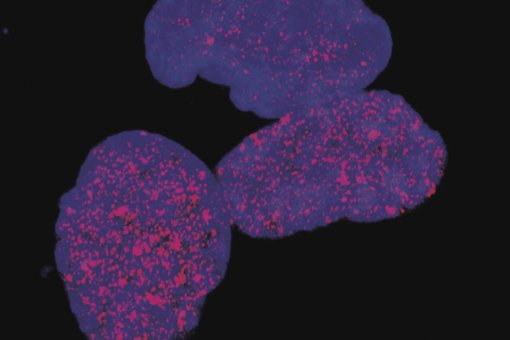Images
Participants
Contact

Different kinds of tumors start to develop as a result of specific combinations of errors in the processes that safeguard cell integrity.
A study by Travis H. Stracker, researcher at the Institute for Research in Biomedicine (IRB Barcelona), in collaboration with scientists at the Memorial Sloan Kettering Cancer Center (MSKCC) in New York, reveals new information about the origin of tumors. In this study, published in the journal Proceedings of the National Academy of Sciences (PNAS), the scientists postulate that the initiation of a tumor and the type and aggressivity of the same depend on a specific combination of defects in several processes that safeguard cell integrity, such as DNA repair pathways and cell cycle check-points. The study also demonstrates that mice with a high degree of chromosomal instability and defective programmed cell death (apoptosis), two hallmarks of cancer, rarely develop tumors.
“Whether or not a tumor develops depends on the moment of the cell cycle in which the damage occurs, which repair pathways components are affected, and which others are impaired in terms of apoptosis and cell cycle arrest”, explains the North-American Travis H. Stracker, head of the “Genomic Instability and Cancer” group and an expert in DNA repair pathways and its implications on human health. In this study, T. Stracker and his team report on some of these combinations for the initiation of cancer and in different kinds of tissue. “The paper points out that our understanding of which aspects of damage response promote tumorigenesis and where they play a role in the process needs to be investigated further because it shows that it has been generalized and that there is a lot of specifics that are not at all clear.”
The researchers utilized mice carrying mutations in key DNA repair genes involved in cancer. Next, they combined them with other mutations affecting cell cycle checkpoints or apoptosis until they hit upon the combinations that are sufficient to initiate tumorigenesis or to generate certain types of tumors. “It is like deconstructing cancer to find the factors responsible for it appearing”, says T. Stracker.
During DNA replication in a dividing cell there is a series of checkpoints to test that duplication is taking place properly. If the cell detects errors in any of these phases, cell growth is halted and highly complex DNA repair processes are triggered. If the repair is defective and the cell accumulates many genomic errors, “watch-out” proteins step in, such as tumor suppressor p53. Such proteins activate apoptosis or cell cycle arrest (senescence). “A very complex network of pathways and proteins are involved”, explains the researcher.
“This study demonstrates that genomic instability per se is not sufficient to initiate a tumor and that we cannot generalize. We need to study the origin of different kinds of cancer in much greater depth and although it is as difficult as trying to find a needle in a haystack, we are slowly identifying the parts on which we should focus”, he goes on to explain. The detection of the main players that cause different kinds of cancer could be of great interest for the design of new diagnostic tools and specific treatments.
Reference article:
Cell cycle and DNA repair pathway specific effects of apoptosis on tumor suppresion
Steven S. Foster, Saurav De, Linda K. Johnson, John H.J. Petrini, and Travis H. Stracker
PNAS (2012). doi:10.1073/pnas.1120476109
About IRB Barcelona
The Institute for Research in Biomedicine (IRB Barcelona) pursues a society free of disease. To this end, it conducts multidisciplinary research of excellence to cure cancer and other diseases linked to ageing. It establishes technology transfer agreements with the pharmaceutical industry and major hospitals to bring research results closer to society, and organises a range of science outreach activities to engage the public in an open dialogue. IRB Barcelona is an international centre that hosts 400 researchers and more than 30 nationalities. Recognised as a Severo Ochoa Centre of Excellence since 2011, IRB Barcelona is a CERCA centre and member of the Barcelona Institute of Science and Technology (BIST).





